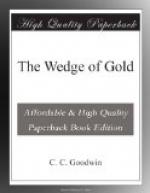Then Browning said: “You are all right, looking from a present horizon; all wrong, when the years are taken into account. The great country of the world is to be the country that produces the metals in the greatest quantity and variety, and whose people acquire the art of turning them to the best account. This ship that we are on, a few months ago, was but unsightly ore in the ground. Look at it now! Tried by fire and fused with labor, it has grown into this marvelous structure. England’s greatness and wealth are due, primarily, all to her mining. Her civilization can be measured by her progress in reducing metals. She will begin to fall behind soon, for America has, in addition to such mines as England possesses, endless mines of gold and silver, and, after all, the precious metals rule the nations and measure their civilization. It has always been so and always will be. Those mines in America will build up greater manufactures than England possesses; they will create artists more skilled than even beautiful France can boast of. A hundred years hence, all other nations will be second-class by comparison.”
The next day the conversation was resumed and carried on with much spirit, until Sedgwick, who had been reading through it all, laid down his book, and in a brief pause of the talk said:
“Neither fruitful fields, rich mines, nor skilled artisans, nor all combined, are enough to make great nations. A hundred nations existed when Rome was founded. They had as fair prospects as did Rome, but ninety of the hundred are forgotten; the other ten are remembered but as inferior nations. It was the stock of men and women that made Rome’s grandeur and terror. For five hundred years an unfaithful wife was never known in Rome. The result was Rome had to be great and grand.
“I stood once on the crest of the Rocky Mountains in Montana. Near together were two springs, out of each of which the water flowed away in a creek. One follows the mountains down to the eastward, the other to the west. One finds its final home in the Gulf of Mexico, the other in the Pacific. The one takes on other streams, its volume steadily swells; before it flows far its channel is hewed through fertile fields; gaining in power, the argosies of commerce find a home upon its broad bosom, and it is a recognized power in the world, a mighty factor in the calculations of merchants and shippers.
“But in the meantime it becomes tainted, until at last when it finds its grave in the Gulf, so foul are its waters that they discolor for miles the deep blue of the sea.
“The other starts with a babble as joyous as the carols of childhood; when it reaches the valley it begins its struggle through a lava-blasted desert; when the desert is passed, it has to grind its channel through rugged mountains that tear its waters into foam, and at last in mighty throes, on the stormy bar it finds its grave in the roaring ocean. Its existence is one long, mighty struggle; there are awful chasms in its path into which it is hurled; the thirsty desert encroaches upon its current; mountains block its way; at the very last furious seas seek to beat it back, but to the end it holds itself pure as when it starts on its way from the mountain spring.




